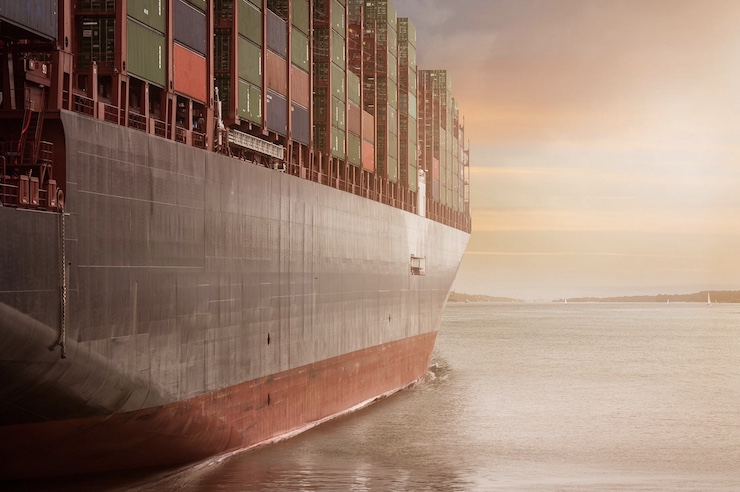Nigeria To Being Using Drones to Help Counter Piracy of Cargo Ships

The earliest acts of documented piracy date back to the 14th century. While acts of piracy can be committed on land, in the air, or through cyber channels, the term mostly refers to acts of violence or robbery in maritime environments. With the advancement of modern weapons and speedboats, piracy has changed. Today mother ships supply small motorboats with the weapons needed to attack small crews onboard cargo ships. It is estimated that piracy contributes to a worldwide loss of $16 billion a year. The Gulf of Guinea off the western coast of Africa has become particularly vulnerable to pirate attacks. With 853km of coastline along the Gulf, many of the attacks are concentrated in Nigerian waters.
There is not one simple reason why piracy has become so rampant off the coast of Nigeria. It is a combination of factors stemming from poverty and unemployment, political disputes, corruption, and inadequate policies to deal with the situation. Over the last decade, there have been thousands of acts of piracy in the Gulf of Guinea. The pirates abscond with cargoes and commit acts of extreme violence on the crews. With pressure from the United Nations, the Nigerian Maritime Administration and Safety Agency (NIMASA) has implemented several programs to combat piracy. NIMAS is finally ready to begin employing the latest of these programs called the Deep Blue Project.
The Nigerian government has allocated $195 million to support Deep Blue Project with state of the art equipment. This includes a fleet of sea vehicles, manned and unmanned aircraft. Specifically, NIMASA will have 16 armored and 17 fast interceptor boats, 2 special mission vessels, 2 aircraft, 2 helicopters, and 4 drones. “We will have enough vessels located in the water, watching the water full time,” said Nigerian Transport Minister Rotimi Amaechi at a press conference this past February. “You have aircraft watching the water, drones watching the water and all of them have the capacity to respond.” Now it is just a matter of finalizing the program parameters to begin a plan of action.
The procurement of all of the new vessels and the training needed to use them was delayed because of COVID-19, though Director-General of NIMASA, Dr. Bashir Jamoh said that NIMASA has found a way around this and will now begin training staff to use the new fleet of anti-piracy tools. Israeli maritime defense company and creator of Deep Blue securities, Blue Octagon, has set up NIMASA with all of the equipment and training needed to keep the Nigerian coast safe. As stated on Blue Octagon’s website, “The oceans are vast- an ideal hiding place for hostile actors engaged in criminal activities and terrorism. From environmental pollution to illegal fishing, oil theft and illegal immigration, protecting a nation’s coastlines and maritime resources depends upon innovative security solutions.”
Blue Octagon’s Deep Blue system goes beyond deploying vessels to patrol the waters. The vessels are equipped with smart technology that keeps an eye on the surroundings far greater than a lookout with a pair of binoculars. Using drones, Deep Blue repeatedly patrols a region, collecting data that is turned into predictive models. These models are then used to not only intercept acts of piracy but to prevent them from happening at all. The drones will become a key piece of the operation as they can be used to gather data in a larger scope than any of the other vessels in Deep Blue Project. Nigeria’s Gulf of Guinea neighbors will also be looking into drones to supplement Nigeria’s efforts to keep pirates at bay. “Indeed, we are working towards establishing UAV wings in Lagos, Calabar, and Port Harcourt to support other security agencies in maintaining the security of the maritime environment,” reported Nigerian Air Force Chief of Air Staff, Air Marshal Sadique Abubakar.
The Nigerian government has put a lot of money and effort into Deep Blue Project. However, they believe Deep Blue Project will be more effective and less expensive than the current anti-piracy measures. Right now shipping companies employ private security that is supplemented by the government. Each of these private security teams can cost upwards of $10,000 a day. While private security acts as somewhat of a deterrent, pirates still seem to have the upper hand. With the support from Blue Octagon, NISAMA aims to eradicate piracy beginning in June of 2021. “The Deep Blue Project,” Dr. Bashir Jamoh said, “is geared towards building a formidable integrated surveillance and security architecture that will comprehensively combat maritime crime and criminalities in Nigeria’s waterways up to the Gulf of Guinea.
|